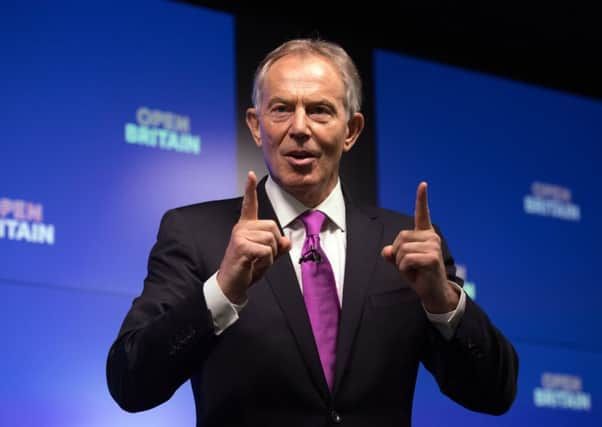Euan McColm: Why Blair speech heralds birth of a new party


While Blair proclaimed his desire to persuade voters to change their minds over Brexit, the party he once led maintained its position that the people have spoken and the UK’s departure from the EU must proceed.
It is unlikely – much as many might hope otherwise – that Blair will succeed in his mission. Prime Minister Theresa May has made it abundantly clear that Brexit (which means Brexit) is an inevitability; there is to be no reneging on this promise made to voters.
Advertisement
Hide AdAdvertisement
Hide AdBut even though a divisive ex-PM stands no chance of turning this particular tide, at least Blair is speaking up for the 48 per cent of people who wished to see the UK retain its membership of the European club. Labour – already plummeting in the polls – has sealed its fate by failing to do likewise.
Yes, it is certainly true that the people spoke in last June’s referendum. But the idea that the country can now move forward as one on this issue is a nonsense.
We have seen in Scotland how a referendum on the constitution can recalibrate politics. Where once our debate might have been over the respective merits of left versus right, now the battle is between unionists and nationalists. And this emotive, fractious argument shows no sign of cooling.
In Scotland, the Conservatives under Ruth Davidson positioned themselves as the defenders of the Union. We speak, she said, for those who voted No to independence. This understanding of the new rules of engagement breathed life into the Scottish Tories and helped them leapfrog Labour in the polls.
Labour at a UK level should have branded itself the party for Remain voters. Those who wished to stay in the EU may have formed a minority but it is a sizeable one and Labour’s decision to ignore them may yet prove fatal.
Labour MPs who have now agreed to play their part in ensuring a swift Brexit are fools if they believe there is anything to be gained electorally from their position.
Voters who wanted the UK out of Europe can get the red-blooded, full-fat version of isolationism from the Tory right and Ukip. By comparison, Labour’s Brexit vision – we’ll support it but we don’t like it – lacks oomph.
In recent years, many people – especially politicians and smart aleck commentators like me – have been slow to grasp the scale of change in politics: the SNP’s first Holyrood victory in 2007 was a blip; there was no way British voters would choose the uncertainty of Brexit over the security offered by membership of the EU; not in a million years would Americans elect the bullshitting boor Trump as their president.
Advertisement
Hide AdAdvertisement
Hide AdBut all of these things happened and, rather than being freak events, they are the stuff of mainstream politics.
If we accept that the lines of political battle have been completely redrawn, the question of what purpose the Labour Party now serves demands an answer.
There are those in Labour – the centrists so despised by Corbyn’s acolytes – who cling to the hope that one day their party will return to its fighting weight and begin winning elections again.
I’m increasingly of the view that those optimists are wrong.
If our politics is to be of nationalism versus internationalism, of open versus closed, then it’s time not for new campaign groups but for a new party to speak up for those who reject the insularity of Brexit.
The arguments against the establishment of a new mainstream political party that might speak for those voters currently being ignored by both Labour and the Tories are well rehearsed. Chief among them is the prediction that a new party would simply split the existing vote and allow the right to dominate in perpetuity.
But what if Labour really is dying? What if its time is up?
If this is so – and it certainly seems to be – then isn’t this the moment for those who see themselves as progressive to act?
No, I don’t for a moment imagine that a new political party would suddenly become the preference of a majority of voters but the scale of the task ahead should not preclude an attempt to achieve it.
Advertisement
Hide AdAdvertisement
Hide AdHigh calibre politicians such as Tories Ken Clarke and George Osborne, former Liberal Democrat leader Nick Clegg, and – yes – Tony Blair are more united than divided by their beliefs in this new era of petty nationalism. They, and many others, are firmly on the losing side of the current political argument. But together, campaigning under a new banner, perhaps they could make progress.
The dark tide sweeping across our politics was enabled, in part, because of the complacent belief of those who once dominated the mainstream that voters wouldn’t gamble on “outsiders” such as Donald Trump or Nigel Farage. But people did gamble, didn’t they? And, boy, did they bet large. This being so, the time for inaction is gone.
A dying Labour Party combined with a Tory Party being driven by the Little Englanders who fuelled the Brexit juggernaut is a recipe for an ever more inward looking United Kingdom.
In politics, as in most areas of life, nothing lasts forever. The UK’s imminent departure from the EU stands testament to that truth. Change is possible, and it can come rapidly.
A new party with internationalism and social democracy at its heart would give a voice to a constituency currently all but ignored by MPs. Such a party could not prevent Brexit – that ramshackle ship is on the slipway, its launch now unstoppable – but it could offer a credible alternative to the cheap and lazy populism that’s currently in vogue.
The Labour Party is on its deathbed. The circle of political life demands the birth of a new party to take its place.